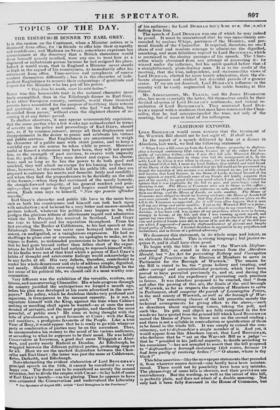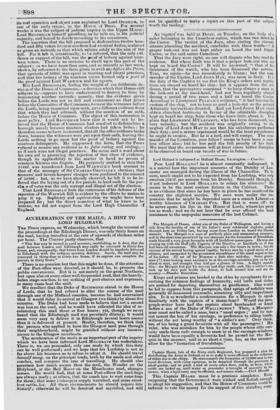FALSEHOOD EXPOSED.
LORD BROUGHAM would seem anxious that the treatment of the Warwick Bill should not be lost sight of. It shall not.
In the report of a speech delivered by him at a dinner in Aberdeen, last week, we find the following statement.
When I saw a bill come up from the Lower House, proposing to disfran- chise a borough containing 1250 voters, lo-cause 19 of the voters had been guilty of receiving bribes,āwhen I saw that bill (Me Warwieh Disfran- chisement Bill) abandoned by those who had the management of it, by the noble Lord by whom it was taken in charge,āfor the noble Lord who was the steady friend of that bill, I mean my Lord Radnor, that faithful and tried friend of the liberty of the subject, was satisfied that the bill could not be persevered in; though the rejection of this measure was wholly charged on me, vet it it a fact well known, that Lord Radnor, in the House of Lords, declared himself of the same opinion as myself, although sonic of my friends dill kindly suppress that part of his speech ; he agreed with every word which I said, and he declared his opinion that it was impossible for the bill to pass, and accordingly voted for throwing it out. The House of Commons were not to blame in this (liar r they have not the power of examining witnesses on oath, and the witnesses told them one thing, and the House of Lords, on (Rah, another. The House of Commons were obliged to decide on hearsay evblenceāthe house of Golds had more sure grounds : the result was, that they Anna the evidence given on the bill to the COMMOUS unsupported; for it will very often happen that a man will sale one thing and swear another. I sat on the Warwick Bill as a judge; I presided in a judicial capacity, to decide according to my conscience. That
decision, it has been said, was against all my prejudices, which were in favour, strongly in ā¢ favour, of the bill, and that 1 was running against myself, and
against my own views. This might be true; and it was also true that my pri- vate and political friends were also in favour of it, and the oldest of the bill was one which I approvedāI mean the disfranchisement of persons and burghs Aund guilty ofbribery. I decided therefore in opposition to my prejudices and inclinations, and in favour of a political adversary."
We denounce this statement, in its whole scope and intent, as an elaborate falsehood. This is strong language ; btit justice re- quires it, and it shall have clear proof.
To begin with the title : it was not " the Warwick Disfran- chisement Bill," as stated in this extract from the Aberdeen Herald, but " An Act for preventing Bribery and Corruption and Illegal Practices in the Election of Members to serve in Parliament for the Borough of Warwick." The reason for the Bill is stated to be, the " gross bribery and treating, and other corrupt and unconstitutional practices, which have been proved to have prevailed previously to, and at, and during the last election," and the expediency of preventing such practices in future. It was therefore proposed to be enacted, that " from and after the passing of this act, the limits of the said borough of Warwick, as far as respects the election of Members to serve in Parliament, shall comprise the parish of Leamington Priors, in the said county of Warwick, as well as the borough of War- wick." The remaining clauses of the bill prescribe merely the technical arrangements for giving effect to the above,āsuch as directions about registering voters, taking the poll, and such like. Its pith and object are fully comprised in the few words we have quoted from the printed bill which Lord BeoUGFIAM moved the House of Peers to throw out on the second reading ; and there is not a syllable in contradiction or qualification of them to he found in the whole bill. It was simply to extend the con- stituency, not to-disfranchise a single member of it. And yet, it would appear from this Aberdeen report, that Lord BROUGHAM, who declares that he " sat on the Warwick Bill as a jadge "- that he " presided in his judicial capacity, to decide according to his conscience "āhas not scrupled to assert that the bill proposed to "disfranchise a borough containing 1250 voters, because 19 had been guilty of receiving bribes 1"ā" 0 shame, where is thy -blush ?"
This false assertionālike the newspaper statements that preceded it, from whatever source derivedācan hardly have been uninten- tional. There could not by possibility have been any mistake. The phraseology of some bills is obscure, and their provisions are contradictory. But the wording, as well as the intent of this bill, is perfectly plain, and 'does not admit of' a double meaning. Not only had it been fully discussed in the House of Commons, but its real operation acd object were explained by Lord Duastame in one of the early stages, in the House of Peers. For several weeks it was the subject of judicial inquiry in the Upper House; Lord BROUGHAM himself presiding, as lie tells us, in his judicial capacity, and bound' to decide according to his conscience. The assertion that the bill proposed to disfranchise twelve hun- dred and fifty voters because nineteen had received bribes, is almost as gross an untruth as that which relates solely to the aim of the bill. For it left it, intentionally, to to inferred, that the only evi- dence in support of the bill, was the proof of bribery against nine- teen voters. There is no occasion to dwell upon this part of the subject ; as we have more than once, and so recently as last week, shown, by reference to the facts given in evidunca before the Peers, that upwards of 50001. was spent in treating and illegal practices, and that the bribery of the nineteen voters formed only a part of the proof against Lord WARWICK and his agents. But Lord BROUGHAM, feeling the weight of the deliberate de- cision of the I louse of Commons,āa decision which that House still adheres to,āappears to have endeavoured to destroy its force by insinuating another untruth ; namely, that the evidence given before the Lords was not so full and criminatory as that given before the Committee of the Commons, because the witnesses before the Lords, being examined upon oath, gave different evidence from that which they had affirmed, without the sanction of an oath, before the House of Commons. The object of this insinuation is must pastry. Lord BROUGHAM knew that it would not be be- lieved that the House of Commons had resolved to disfranchise a borough merely because nineteen electors had taken bribes : he therefore seems to have insinuated, that all the otherevidence broke down, because the witnesses were put upon their oath, leaving the Lords nothing to go upon but the proof of bribery against the nineteen delinquents. He suppressed the facts, that the Peers refused to receive any evidence as to false rating and rioting,ā as if such were not illegal practices. He never said a word about his own aid in procuring the rejection of this class of evidence, though its applicability to the matter in hand no person of common fairness can dispute. He purposely omitted to state that 31001. was transferred from Lord WARWICK'S bank account to that of the manager of Sir CHARLES GREVILLE'S election; that mercers' and tavern-keepers charges were produced to the amount of 50001.: but, as we have already observed, he left it to be in- ferred that the laying out of a few pounds in hard cash for the pur- cha e of votes was the only corrupt and illegal act of the election.
That Lord BROUGHAM feels the rottenness of his defence of the rejection of the Warwick Bill is evident by the efforts he makes to prop it up. Sophistry and equivocation we might have been prepared for ; but the direct assertion of what lie knew to be untrne, we did not expect from the Lord High Chancellor t if England.





















 Previous page
Previous page